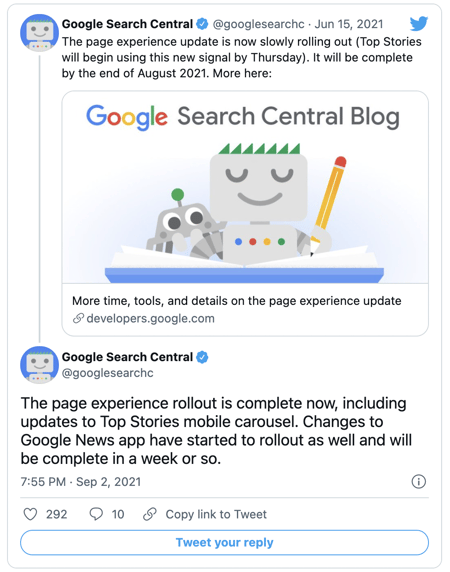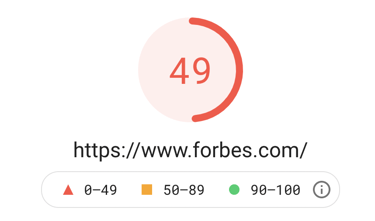To work out where websites should rank, Google uses a complex ranking system that evaluates hundreds of different factors – from the number of external links (or citations) pointing at your site to depth of your content, or the length of time it takes your pages to load.

Now, before we go any further, it’s important to understand that this ranking system isn’t set in stone. Much to the chagrin of SEO specialists over the globe, Google’s engineers are constantly making tweaks and revisions to their core search algorithms.
Experts think the search giant now rolls out approximately 4,500 minor adjustments every year (Source: Search Engine Land). That’s 12 changes a day, and it’s worth remembering that we’ve already seen two (fairly substantial) broad core updates this summer: One in June, and another in early July.
But broad core updates aside, we think it’s probably fair to say that 99% of Google’s routine tweaks go completely unnoticed by the SEO community at large. They normally change relatively minor things like the way sites are penalised for using intrusive pop ups, or the way Google handles over-optimised title tags, which can make them fairly hard to detect.
Even using industry-leading tools like SEMRush’s volatility checker, we only see sporadic spikes in SERP volatility (a measure of how much movement there is on the average results page).
But this year’s Page Experience update promised to be a little different. Years in the making, it was supposed to help Google analyse your website’s user experience or UX. In Google’s own words:
"Page experience is a set of signals that measure how users perceive the experience of interacting with a web page beyond its pure information value.”
The reasoning is easy to follow: Promoting clean, modern websites with responsive navigation and interactive elements should provide Google’s customers with a better overall experience – and ensure that they keep coming back to the platform for years to come.
But training an algorithm to accurately assess a website’s user experience is no mean feat. Google engineers had to work out how to identify, track and analyse metrics that could accurately measure real-world user experience, and tune it for the huge variety of websites currently ranking in search.
As such, we’d expected some fairly significant delays, and some pretty seismic shifts in search rankings as sites with poor user experience started to drop off the map.
We’re not just talking about your typical slow, clunky or outdated websites here either. Plenty of big sites with good rankings have terrible UX; surviving on the strength of their content instead of refreshing the design of their website – or optimising the underlying code to make their web pages more responsive.
The Forbes site is a good example. Like so many news sites, it’s slow to load, full of invasive ads and prone to some seriously vexatious layout shift that kicks in as soon as you start scrolling down a page.
 In short, it’s irritating to use and we think a great many SEO specialists were looking forward to seeing sites like this get their comeuppance – or at least scramble to modernise so they could stay ahead of the game.
In short, it’s irritating to use and we think a great many SEO specialists were looking forward to seeing sites like this get their comeuppance – or at least scramble to modernise so they could stay ahead of the game.
The Page Experience update finished rolling out on September 2nd, a few days behind schedule.

Now that the dust has finally settled, we thought it was high time we published a retrospective – looking at what the update actually changed and whether Google’s search team has really made significant changes to the way Google ranks a site.
What Did The Page Experience Update Look For?
To analyse your website’s user experience, the Page Experience update looks at:
- Your Core Web Vitals (responsiveness, interactivity and stability)
- The mobile friendliness of your site
- Your site’s security credentials
- The way you use pop-ups and other intrusive interstitials
We’ve written a lengthy blog post about Core Web Vitals here, and the other factors are reasonably straightforward.
Mobile friendliness looks at your site’s mobile page speed, how responsive your design is and whether your pages display well on various mobile devices. Site security is measured by looking for a valid HTTPS certificate and mobile accessibility is assessed by measuring the size of any pop ups or interstitials that load in front of your content.

How Effective Was The Page Experience Update?
Since the Page Experience update rolled out, we have seen some volatility on competitive results pages.

But most experts were underwhelmed by the update, with industry veterans like Barry Schwartz saying that he was generally “disappointed” with the scope and impact of the changes. (Source: SEO Roundtable).
Google themselves have also moved to downplay the significance of this update, saying:
"While page experience is important, Google still seeks to rank pages with the best information overall, even if the page experience is subpar. Great page experience doesn't override having great page content. However, in cases where there are many pages that may be similar in relevance, page experience can be much more important for visibility in Search.”
When it first aired, this statement prompted rumours that the Page Experience update was little more than a tiebreaker between pages with otherwise comparable content but John Mueller (Google’s senior webmaster trends analyst) was swift to deny this, saying:
“It’s more than a tie-breaker, but it also doesn’t replace relevance...Depending on the sites you work on, you might notice it more, or you might notice it less.”
So the truth is probably somewhere in the middle: Yes, Page Experience signals matter, but probably not as much as we expected them to.
Case in point: The aforementioned Forbes site still ranks on a number of competitive search pages, but if we look at its scores on Page Speed Insights, we can see that it’s slow
 And that it falls short on a few of the Core Web Vitals.
And that it falls short on a few of the Core Web Vitals.

Proof, if nothing else, that the Page Experience update hasn’t done enough to shift the dial.
What Should I Do If I Was Hit By The Page Experience Update?
If you think your site could be one of the few domains hit by the page experience update, it’s probably best to sit down and talk with your dev team.
You can use free tools like Google’s PageSpeed Insights or Lighthouse to see how you’re scoring for your Core Web Vitals, and your dev team are probably best placed to help you implement any changes or tweaks.
You should also check that you have a valid HTTPS certificate, that your site is mobile friendly and that you’re not using invasive or annoying pop-ups on your key landing pages.
If you don’t have a dev team or you’d like a team of seasoned industry veterans to take a look at your site, drop us a call.
We’re always happy to help people get their site in-line with Google’s best practice guidelines and we’re well placed to support any B2B business struggling with their search engine rankings.

Will The Page Experience Update Change SEO?
It’s hard to say. While it’s great to see that Google does understand the importance of good UX, this update didn’t do enough to penalise sites that frustrate or irritate users.
We can hope that future updates will build on these foundations, but if the Page Experience update marks Google’s only attempt at incorporating UX signals, we probably won’t see any real change in the type of website dominating results pages.
The good news is that Google almost always iterates on their updates, so there’s a very good chance that signals like your Core Web Vitals will become more important in the future.
In fact, we’d go so far as to say that they’ll inevitably end up being of critical importance which is why all of our web builds prioritise mobile responsiveness, core web vitals, secure infrastructure and a user-friendly layout.
Key Takeaways
- Google’s Page Experience update is supposed to help the search giant rank sites according to the quality of user experience they offer visitors
- The update analysis your site’s core web vitals, mobile responsiveness, security credentials and accessibility
- So far, the Page Experience update hasn’t changed much but we do expect these signals to become more important as time goes on
- If you think you might have been penalised by the Page Experience update, get in touch. We’re here to help you get your rankings back on track.

